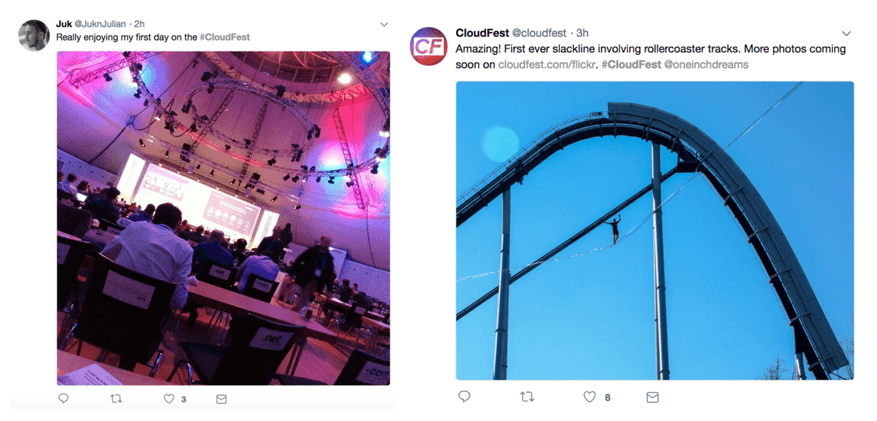The Cloud's Future is Bright, but Where Exactly is it Heading?

Last week, CloudFest, the global cloud industry and internet innovation conference, took over Germany's largest theme park, Europa-Park. If you've ever wondered what a keynote inside a circus tent looks like, here you go:

But CloudFest was full of more than just 7,000 liters of beer and rollercoasters. More than 6,500 professionals from across the entire ecosystem were represented at the world's largest cloud and web hosting event, making the content and dialogue some of the best that the industry has each year.
Undoubtedly, the topic of conversation at #CloudFest 2018 was around the future of the cloud industry, which is at the beginning of a significant growth curve. Today, Gartner estimates the public cloud services market is valued at about $260 billion, a number which will balloon to $411.4 billion by 2020.
What's driving cloud adoption?
Laurent Allard, vice-chairman at OVH, said there are several key factors fueling this growth: 1. "Hoster of Hosters" - This new emerging model presents opportunity for growth on value-added services. With SaaS services built upon cloud infrastructure, we've reached the point where the greatest growth inflection isn't in the underlying infrastructure growth, but in the services that reside upon it. Services like CodeGuard, that utilize the cloud, are better able to bring innovation to customers globally.
2. Mid-market and Enterprise Adoption - While SMB's continue to comprise the largest market share, Allard said mid to large sized companies will quickly begin to take a bigger piece of the pie. In fact, Graham Crich, EMEA leader for VMware's vCloud Air Network, disclosed that 80% of their enterprise customers anticipate relying on multiple clouds in the future.
3. Move Over North America - Like SMB's, North America continues to dominate cloud usage, but Allard said the industry should pay attention to emerging countries, like Brazil and South Africa, where adoption is taking hold and offering significant market opportunities.
How should the industry prepare?
 On the first day of conference sessions, I explained how common factors that drove the growth of Facebook, electric cars and web hosting are still relevant in today's world. I argued that the cloud industry should be thinking about new technology adoption and future product launches. For example, it would have been extremely helpful if Facebook had embraced predictions from most diffusion models in 2013, that it would be declining in new user growth just a few years later in 2018. Perhaps Facebook was aware of this and instead focused on monetization. It is extremely helpful for older and newer technologies to consider which customer segment they are targeting - along the technology adoption lifecycle - and allow that information to drive their go-to-market strategy.
On the first day of conference sessions, I explained how common factors that drove the growth of Facebook, electric cars and web hosting are still relevant in today's world. I argued that the cloud industry should be thinking about new technology adoption and future product launches. For example, it would have been extremely helpful if Facebook had embraced predictions from most diffusion models in 2013, that it would be declining in new user growth just a few years later in 2018. Perhaps Facebook was aware of this and instead focused on monetization. It is extremely helpful for older and newer technologies to consider which customer segment they are targeting - along the technology adoption lifecycle - and allow that information to drive their go-to-market strategy.
In addition to rethinking the technology adoption lifecycle, several CloudFest speakers urged the industry to leverage Trust Services and machine learning tools to harden cloud servers. One of these infosecurity experts was Igor Seletsky, CEO of CloudLinux, who detailed rising cyber threats. For example, WordPress is attack target No. 1 for hackers.
For many hosting vendors in attendance, at the heart of the security and privacy discussion is trust. CloudFest concluded with futurist Ian Khan discussing how our industry can recreate trust in today's paranoid world. He argued that the emergence of cloud, AI and blockchain has given 'trust' a new definition and many new applications. He said that trust, when enabled with technology, is the new currency of business.
By the end of the week, it was clear that all of the speakers and sessions were focused on a common objective - spurring cloud market growth and continued innovation. Next year, as our industry continues its rapid growth curve, I predict the Fest will be dominated with conversations of globalism versus nationalism and the impact on technology adoption, the repercussions of attempted GDPR compliance, and, of course, Donald Trump.
About the Author: David Moeller is the CEO and co-founder of Atlanta-based CodeGuard, a leading provider of cloud website backup services. While establishing this new category, he grew the company from an idea to over 150,000 customers. CodeGuard has received Audience Choice awards from TechCrunch Disrupt, VentureAtlanta, and the MIT Enterprise Forum.







